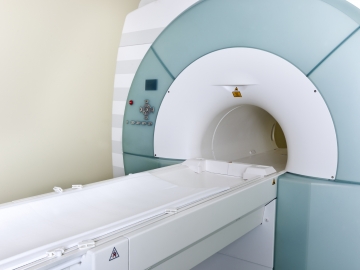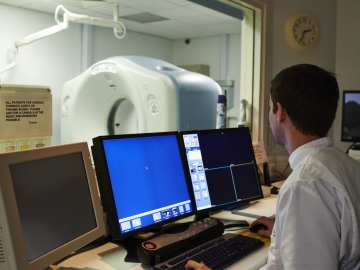Adult
- About
- Meet The Team
- Conditions
- Patient Feedback
- Making the most of your clinic appointment
- Your Appointment in Outpatients
- Easy Read Guide for Out Patients
- Cardiac Catheter
- Transoesophageal Echocardiogram
- MRI
- Surgery & "Top Tips" for coming into hospital
- Lifestyle Advice
- Exercise
- Heart Failure
- End of Life and Palliative Care
- Looking after your oral health
- Dentists Information Section: Dental care in adults at risk of Infective Endocarditis
- Yorkshire Regional Genetic Service
- Support
- Video Diaries
- Second Opinion
- Monitoring Results at Leeds Infirmary
- Professionals
MRI
-
This page provides you with information about having a Magnetic Resonance (MR) scan of the heart or blood vessels.
Magnetic Resonance Imaging (MRI) is a painless and harmless way of looking inside the body without using X-rays. Images are produced of the heart and blood vessels using magnets and radio waves. Sometimes an injection (via a small tube in the arm) of a contrast agent (dye) is used to highlight the heart or blood vessels.
Why do I need an MRI?
It can provide the medical staff with information about the size of heart vessels, and how well the heart pumps. This information allows us to plan the right treatment for you.

-

Important information relating to the scan
A checklist will be completed with you PRIOR to doing the scan, to ensure we do the scan safely. It may not be possible to do the scan if you have any of the following:
- A pacemaker
- Previous brain surgery
- Any metal parts in your body!
- You will need to remove all jewellery, any clothing with metal zips or underwear with metal clips. You are unable to wear glasses, watches & hearing aids, so will be asked to remove these prior to the scan.
-
What the scan involves
- You lie on a couch, attached to a heart rate monitor
- A coil is placed over your heart to receive the radio signal
- You move into the scanner, so that your heart is in the middle of the scanner
- You will have to lie still and you will be asked to hold your breath for as long as you can, as this provides the operator with good images
- The scanner can be noisy – this is perfectly normal, so try not to worry
- The scan can sometimes last an hour or even longer – you can bring in a music CD if you wish the staff to play some music of your choice, whilst you are having the scan
What if I can’t make the appointment?
Please let the MRI department know in plenty of time if you are unable to make your appointment to allow them to get another patient booked in. MRI scans are extremely expensive and failing to attend an MRI appointment wastes well over a thousand pounds of NHS money.
Results
The results of the scan will be sent to your cardiologist, who will write to you with the results
